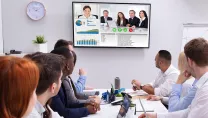Through remote working, the COVID-19 pandemic effectively changed the way businesses worked overnight. It also had an impact on wider company culture. Here, Phil Herbert, Vice President of HR at Sharp Europe, discusses those culture changes with Hudson RPO.
Over the last 12 months, COVID-19 has forced businesses of all sizes to dramatically change the way they operate. Gone is the idea of the daily commute and endless office meetings. Instead, social distancing, restricted travel and the need to shield the more vulnerable within our communities, have forced businesses to adopt on masse remote and hybrid working.
However, we are starting to see a change in working patterns, thanks to the impact of the vaccination rollout, as businesses start thinking once again about opening up work spaces. According to the latest Office for National Statistics figures, more than a third of UK employees are still working remotely.
Phil Herbert, Vice President of HR at Sharp Europe, answers questions on how the pandemic has impacted Sharp Europe and how it operates.
What impact has remote working had on Sharp Europe?
Phil Herbert: Pre-pandemic, we had some flexible working practice but not to a large extent. The expectation was that people should generally be in the office. However, the pandemic has forced us to work remotely and this has been a huge jump for the organisation, both from a physical ‘how-to do it’ and a cultural viewpoint.
Are there now new ways of working at Sharp Europe?
PH: Some of our colleagues weren’t sure how things like Microsoft Teams would work. They preferred their traditional face-to-face departmental meetings, because that’s what we’ve always done and it has worked. But that’s all gone. They’ve been forced to adopt technology and they’ve found that they can have the same meeting, the same productivity and the same output remotely.
We have plans to build on our remote working experiment. In Germany, one of our businesses is already moving to a permanent ‘three-two’ working pattern, where employees will work three days at home and two in the office. This has allowed the organisation to cut office space by a third, directly impacting the bottom line, but at the same time has helped to attract new employees into the organisation.
How does remote working enable Sharp Europe to evolve?
PH: One of our ongoing challenges at Sharp is that we’ve been expanding our business into new sectors, such as IT services. However, that has a very different skillset to our current talent base. Employees have different aspirations and don’t necessarily want to stay in one role for 25 years. They join an organisation because they like the technology it uses and the development opportunities, but they might move on in 3-4 years when new technology comes out.
In the past, an organisation might lose an employee to a competitor based 30 miles away. Now, it might lose an employee to an organisation based 200 miles away, as they don’t need to be in a physical office. Where you can attract talent from has massively widened and what employees expect from employers is different too. Remote working has changed everything.
Is the ‘New Normal’ here to stay, or will we see old ways of working return?
PH: Our European head office is based near Heathrow, so quite often we’d have clients and colleagues fly in for an afternoon of meetings and then leave again. Will we still insist on that, or will we do it virtually? Until we open up, we don’t know.
However, I do think that business as usual face-to-face meetings will diminish substantially. It’s more efficient to do it virtually and people have got used to it, which is the key. There will be a balance between virtual and in person meetings, but we certainly won’t be going back to where we were.
While some colleagues will return to the office full-time, others will have the option of splitting time between home and the office - a situation we as a company wouldn’t have gotten to without the impact of the pandemic.
The COVID-19 pandemic hasn’t changed the overall strategy at Sharp Europe, it has merely accelerated it, forcing us to look at where we need to emphasise greater resources for colleagues, as well as customers.
If you would like to know more about how Sharp Europe is helping businesses devise strategies and deploy the right digital transformations in these rapidly changing times, Get In Touch.
The original version of this interview was carried by Changeboard.





